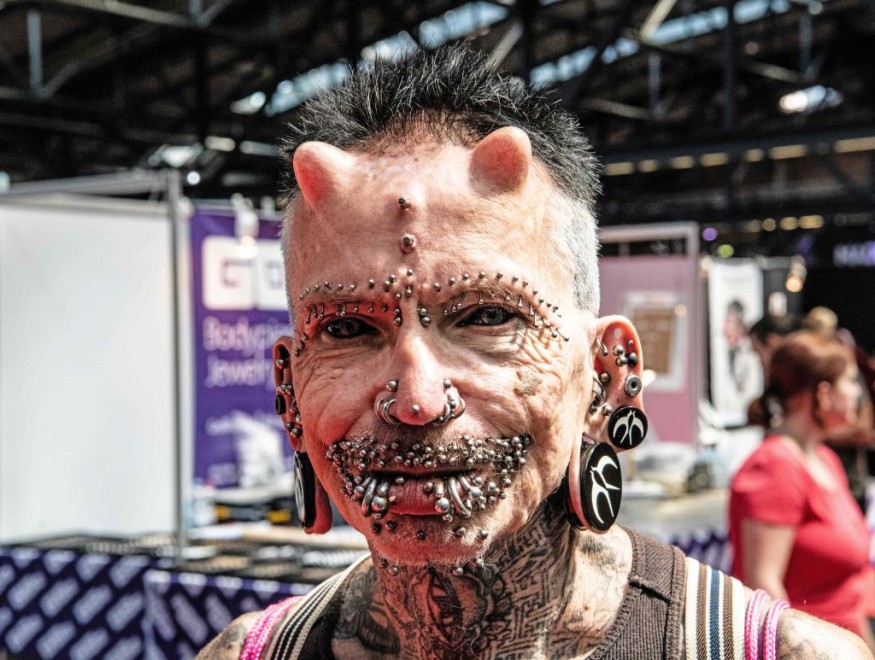
Body piercing is a popular form of body art and a type of modification that involves needles puncturing a hole into the skin to place a piece of jewelry.
It is popular among adolescents and young adults. The ears, lips, belly button, and eyebrows are the usual sites for body piercing. However, while body piercing is a good outlet for self-expression and fashion, it may also cause complications. Find out when piercings could be safe and how to care for them to properly heal and avoid infection.
Piercing model Rolf Buchholz poses on August 3, 2019 at the Tattoo Convention fair in Berlin.
Meet the World's Most Pierced Man
Rolf Buchholz, who lives in Germany, currently holds the Guinness World Record for having the most body piercings. According to Metro, Buchholz has 516 piercings, including 278 on his genitals. The 62-year-old world record holder is a computer scientist who also sports tattooed eyeballs and a split tongue.
He said that he is proud of the title and people have changed their attitude towards his appearance after receiving the world record. Buchholz was verified for most piercings in 2010 and was finally awarded the world record in 2012. Since his proclamation, no one has officially beaten his record.
In an interview on the Guinness World Records YouTube channel, he said the achievement was something special for him. After officially being declared the most pierced man in the world, he became famous. Also, people viewed his body modifications in a better light than before.
Despite enjoying the positive attention, he said that it was never his intention to pursue the goal of breaking world records. He only did it for himself because he finds it good. His body is now full of a collection of black and gray tattoos, piercings, and a number of quirky features.
Is Body Piercing Safe?
Body piercing can carry a measure of risk, such as bacterial infection. But it could be safe when done in a clean and professional environment, according to WebMD. However, the risk of contracting blood-transmitted diseases increases when unclean equipment is used.
Even a sterile environment doesn't guarantee 100% safety as the process itself increases one's risk of chronic infection, skin allergies, abscesses, inflammation or nerve damage, and prolonged bleeding.
It is important to talk to a doctor before getting a body piercing, especially for those with diabetes, heart condition, are pregnant, have a weak immune system, and are taking herbal supplements.
When is Body Piercing Safe
To ensure that body piercing is safe, insist on safety precautions by asking certain questions, according to Mayo Clinic. These questions include the following:
- Who will perform the piercing?
- Will that person be wearing gloves?
- Will that person also use proper equipment?
- Are the tools or equipment sterilized?
- Do they only use hypoallergenic jewelry?
These questions serve as guidelines to ensure that body piercing is done safely. Do not attempt to pierce yourself or let anyone untrained perform the piercing on you. Only go to a licensed and reputable piercing studio where employees are properly trained.
Also, take note that the person should wash his or her hands and wear a pair of disposable gloves for each piercing. The Association of Professional Piercers cautions people to look for a piercer who only uses a fresh, sterile, disposable needle.
Ensure that the piercer has a heat-sterilization machine to sterilize non-disposable equipment after use. Lastly, look for surgical stainless steel, titanium, niobium, or a 14- or 18-carat gold for the jewelry.
RELATED ARTICLE : How Does Piercing Work? Scientists Uncover Mechanics Behind Puncture on Soft Solids
Check out more news and information on Piercing in Science Times.
© 2026 ScienceTimes.com All rights reserved. Do not reproduce without permission. The window to the world of Science Times.











